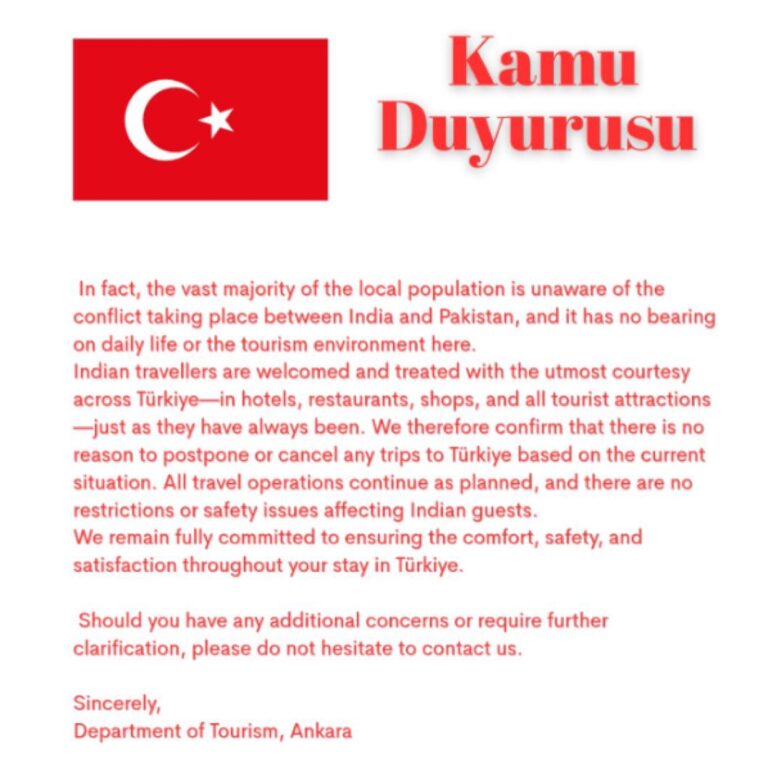From trade to tourism, here’s how Turkey’s perceived support for Pakistan has triggered a nationwide backlash in India.
The ongoing diplomatic fallout between India and Turkey stems from Turkey’s public support for Pakistan during the recent India-Pakistan conflict, particularly after Operation Sindoor — India’s targeted military strikes against terrorist camps in Pakistan.
Although Turkey’s Department of Tourism in Ankara issued a statement assuring Indian travellers of safety and hospitality within the country, this did little to stem the backlash. The Indian public, already incensed by Turkey’s geopolitical stance, viewed the statement as tone-deaf and dismissive of India’s national security concerns. The most visible fallout has been the boycott of Turkish apples, particularly in markets like Pune, where traders stopped purchases altogether. Turkish apples typically account for a seasonal turnover of ₹1,000–1,200 crores, but that supply has now dried up.
BIG NEWS 🚨 Apple traders in Pune say they have decided to boycott Turkish apples because Turkey supported Pakistan
— Times Algebra (@TimesAlgebraIND) May 13, 2025
They said "Turkish apples are sold here for 3 months and this business is worth around Rs 1200-1500 crore" 😱
"When there was an earthquake in Turkey, India was… pic.twitter.com/rP7Yn11mnl
Indian vendors have shifted to sourcing apples from Himachal Pradesh, Uttarakhand, Iran, and other countries. This movement, however, isn’t limited to apples. It has expanded into a broader boycott of Turkish imports, ranging from food products to textiles, driven largely by nationalist sentiment and support for the Indian armed forces.
How Has This Affected Turkish Tourism and Business in India?
Turkey has been a rapidly growing tourist destination for Indian travellers, with a 20.7% year-on-year increase in 2024. Indian tourists contribute significantly to Turkey’s economy—over ₹4,000 crore annually through weddings, business trips, and holidays. However, since Turkey’s political alignment with Pakistan became apparent:
- 80% of Indian bookings to Turkey have been cancelled or postponed.
- Travel platforms and agencies in India have paused or removed Turkey as an active listing.
- Indian travellers are now opting for destinations in Southeast Asia (like Thailand, Vietnam) and parts of Europe over Turkey.
This tourism freeze is expected to severely impact Turkey’s post-pandemic recovery plans for its hospitality sector. Local Turkish businesses that previously catered to Indian tourists are now facing booking drop-offs, refund requests, and a complete halt in new enquiries. Even Turkey’s attempts to downplay the India-Pakistan conflict’s impact—by stating that the “local population is unaware” and that tourism remains unaffected—have been criticized as insensitive. Many Indian citizens felt the statement ignored the gravity of cross-border terrorism and India’s losses, particularly after attacks like the one in Pahalgam.

What’s the Broader Public Sentiment and Economic Impact of the Boycott?
The boycott has taken on a viral dimension, with hashtags like #BoycottTurkey and #BanTurkey trending across social media platforms. Influencers, public figures, and small businesses alike are calling for a ban on Turkish imports and urging Indians to travel elsewhere.
As a result: Demand for Turkish apples has fallen by nearly 50%, driving prices up for apples from other countries and domestic regions. Consumer-facing Turkish brands are seeing reduced sales, and some are pulling back on Indian marketing campaigns altogether. Several Indian politicians and industry leaders have supported the call to curb Turkish imports, viewing the move as both an economic and symbolic response to Turkey’s stance.
The Department of Tourism in Ankara tried to offer damage control by issuing a statement reassuring Indian visitors, emphasizing that travel is safe and welcoming. But the impact on the ground is visible—Indian tourists and businesses are making their preferences clear through their purchasing power. India, known for its large middle class and growing outbound travel economy, holds considerable sway. And now, that power is being used to send a clear political message: support for terrorism or its enablers—real or perceived—will come at a significant economic cost.





















